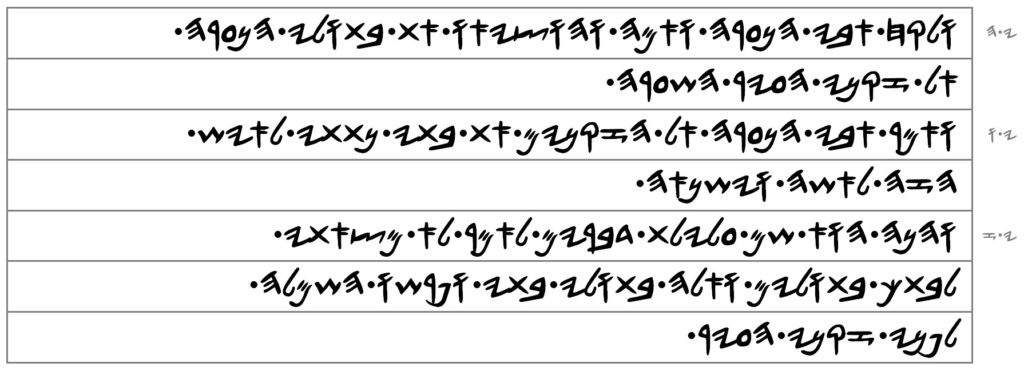

[13] chay yakakh aysh ashah wa-ba’ alay-ha wa-shan’a-ha
When a man takes a woman, and he comes to her, and he hates her
[14] wa-sham la-ha ghalaylath dabaraym wa-hots’ ghalay-ha sham rai wa-amar ha-ashah ha-za’ath lakakhathay wA-akarab alay-ha wa-la’ mats’athay la-ha batholaym
and he puts to her the actions of words, and he causes to go out against her a bad name, and he says: This woman I took, and I came near to her and I did not find her having menstrual cycles.
COMMENTARY OF THORAH 5.22:13-14
[Verse 13] Sex is not what initiates a marriage. According to Thorah, a marriage is initiated when a man, with the blessing of a woman’s father, takes that woman into his home and he becomes her provider and her head. This is proven in the law by the fact that a divorce is only when a man sends a woman out of his house (Thorah 5.24:1). Thus, he needs to put a roof over his wife’s head and provide for her in order for the marriage to be official. If the marriage ends in divorce she leaves his house and he is no longer required to provide for her. In verse 13 it is to be assumed that the man has put a roof over his wife’s head, but after coming near to her, meaning after getting to know her, he falls out of love with her because he thinks there has been foul play.
It is important to point out that the man has not had sex with is wife yet. He has only come near to her according to verse 13, wa-ba’ alay-ha (“and he came to her” not “and he came in unto her”), and verse 14, wA-akarab alay-ha (“I went near to her” not “I went inside her”). These expressions do not mean sexual intercourse must have already taken place. They can mean the husband is becoming acquainted with his new wife before having sex with her by spending time with her in order to get to know her more. Given that marriages were often arranged in those days, it is possible for a husband not to know really anything about his wife until after the wedding. Yet the heathen bible interpreters all disagree and they all contend that the woman in verse 13 is being charged by her husband with not being a virgin because when he had sex with her on their wedding night her hymen did not break and she did not bleed out onto the bed cloth. They are wrong and I am going to prove that they are wrong.
[Verse 14] According to the heathen’s conventional wisdom, the man who has convinced himself that his wife lied about being a virgin begins to give her a bad name, all because he did not find the “tokens of her virginity” during sex with her. The phrase “tokens of virginity” is how the heathens translate the Ghabaray word batholaym in the plural absolute in verse 14 in the 1611 Queen James Virus and in other English translations. The problem is that the word batholah, the singular absolute form, does not mean virgin at all. It never did. Nor does the plural form batholaym mean an intact hymen. There is no single term for virgin in biblical Ghabaray. A virgin has to be described with a negative qualifier, i.e. “who has not known a man” (Thorah 1.24:16; Thorah 4.31:18). Thus, a batholah may or may not be a virgin.
The truth is that the word batholah is an age term for a menstruating female, which means she is ovulating and is able to conceive, i.e. she is of marriageable age.[1] Hence the word batholaym means menstrual cycles in the plural. The ancients knew then just as we know today that it is not normally possible for a girl to become pregnant prior to puberty and the start of her menstrual periods when ovulations commence. They also knew that pregnancy causes menstrual cycles to stop. The husband in verse 13-14 is not accusing his wife of not being a virgin. He is accusing her of not having menstrual cycles.
In other words, he is thinking that the reason she is not menstruating is because she has been impregnated by another man prior to the wedding even though it is too early to tell visibly that she is pregnant. He has not had sex with his wife so she is not pregnant by him and she should be menstruating if she is indeed batholah. He has been waiting to see evidence of menstruation so that by his precaution he can rest assured knowing that there isn’t already something in the oven prior to him taking her as his wife. We learn from this that there is a risk involved with having sex right away on the wedding night. You can be deceived into thinking that a child is yours when in fact it is not.

[15] wa-lakakh abay ha-nairah wa-am-ha wA-hotsay’a-o ath batholay ha-nairah al zakanay ha-ghayr ha-shair-ha
then take the father of the dependent girl and her mother and cause it to be brought out the menstrual cycles of the dependent girl to the elders of the city at the gate.
[16] wA-amar abay ha-nairah al ha-zakanaym ath bathay nathathay la-aysh ha-zah la-ashah wa-yashan’a-ha
and he will say, the father of the dependent girl, to the elders: My daughter I gave to this man for a wife and he hates her.
[17] wa-hanah ho’ sham ghalaylath dabaraym la-amar la mats’athay la-bath-cha batholaym wa-alah batholay bathay wA-parasho ha-shamalah la-panay zakanay ha-ghayr
and behold, he made actions of speech, saying: Not did I find to your daughter menstrual cycles, and these are the menstrual cycles of my daughter. And they will spread out the dress before the elders of the city.
COMMENTARY OF THORAH 5.22:15-17
[Verse 15] The notion that the girl is being accused of not being a virgin, and that her virginity at the time of the marriage is something that can be proved by her parents after the fact, is utterly absurd. Think for a moment. The hymen is not always ruptured during the first sexual intercourse. Even if the prevailing assumption was that the hymen should rupture during the first sexual experience or the new bride was not a virgin, the husband looking for the hymen to rupture on the first night and it does not rupture will most certainly confiscate the bed cloth as his evidence that no bleeding occurred on the wedding night. How then can the parents be called in to challenge his accusation? Challenge it with what? It makes no sense.
On the other hand, if he doesn’t confiscate the bed cloth on the wedding night and he allows the parents of the bride take it into their custody he has given away any chance of ever being able to contest her virginity on the wedding night from that point forward. This also makes no sense.
The above scenarios makes no sense because the heathens who have been interpreting the bible for the past 1,900 years have insisted that virginity is at issue here when it is not.
What is really at issue here, and what is happening in verse 15, is that the girl has been returned to the house of her father because her husband has low key accused her of being impregnated by another man. He has not had sex with his wife, but because she is of age and she should be menstruating there can be only one reason, in his mind at least, why she is not menstruating. The parents of the girl and the girl are now under investigation by the elders who require proof that the girl is in fact batholah. In other words, the girl will be put under the watchful eye of the elders to see if she has her periods, and if so the parents will bring the proof of her periods to the elders at the city gate for the entire public to see.
[Verse 16] The father will make his address to the elders in public at the city gate. He will identify both his daughter and the man he gave her to as a wife, the man who now hates her.
[Verse 17] The father will bring up that the man made actions of speech against his daughter by accusing her to others for not having the batholay ha-nairah (menstrual cycles of the dependent female). The father will then bring out the dress that his daughter was compelled to wear since she was returned to his house. The scripture specifically states that it is a shamalah (dress) and not a bed sheet or bed cloth. The shamalah is an article of clothing worn as an outer garment. There is absolutely no reason a-priori to believe she was wearing this dress, or any other article of clothing for that matter, during the first sexual encounter with her husband on her wedding night. This is another proof that virginity is not at issue here.
She put that dress on the moment she was returned to her father after having been accused of not being a batholah. She was made to wear it to see if it became stained by her own menstrual blood. If the dress became stained it was immediately brought to the elders at gate of the city for everyone in the city to see and to attest that the accusation made against her was not true. She cannot be pregnant and she is fully vindicated.

[18] wA-lakakho zakanay ha-ghayr ha-ho’a ath ha-aysh wa-yasaro atho
Then they will take, the elders of that city, the man and they will punish him.
[19] wA-ghanasho atho ma’ah chasap wA-nathano la-abay ha-nairah chay hotsay’ sham rai ghal batholah Ya’oh-shar-al wa-lo thah’ayh la-ashah la yochal la-shalakh-ha chal yamay-o
and they will fine him 100 [shakals] of silver, and they will give to the father of the dependent girl; because he caused to go out a bad name against a batholah of Ya’oh-shar-al, and to him will she be for a wife; not will he be able to send her away all of his days.
COMMENTARY OF THORAH 5.22:18-19
[Verses 18-19] Silver used to be worth a lot more than it is today and one shakal was a day’s wage in ancient times. Thus, 100 shakals of silver by today’s mean daily wage in America ($220.00 USD a day) would be on the order of $22,000.00 USD. That is what this man will be forced to pay the father if the dress ends up being stained with his daughter’s menstrual blood during the time of the investigation made by the elders of his city. The fine is high because the accusation is so serious it could have meant the death of that girl had the accusation been true and had her dress not become stained by her menstrual blood during the elders’ examination. The man will also lose the right to exercise the power to divorce her for the rest of his life. Only her father can prevent or terminate the marriage if he sees fit to do so. Regardless, the father is still getting paid 100 shakals of silver for the character assassination of his daughter.

[20] wa-am amath hayh ha-dabar ha-zah la namatsa’o batholaym la-nairah
and if true was the word that not was it found the menstrual cycles for the dependent girl
[21] wA-hotsay’a’o ath ha-nairah al pathakh bayth abay-ha wA-sakalo-ha anashay ghayr-ha ba-abanaym wA-mathah chay ghashthah nabalah ba-Ya’oh-shar-al la-zanoth bayth abay-ha wA-bairatha ha-rai ma-karab-cha
then they will cause to bring out the dependent girl to the door of the house of her father, and they will stone her, the men of her city, by stones and she will die because she did folly in Ya’oh-shar-al to act a whore in the house of her father, and you will put away the evil from among you.
COMMENTARY OF THORAH 5.22:20-21
[Verses 20-21] If it turns out to be true, and the dress does not become stained with her menstrual blood during the period of the elders’ examination, then the elders are to judge that her menstrual cycles have stopped (or they never commenced) because she has been impregnated by another man prior to the wedding. For this she is to be brought out of her father’s house, proving that she was returned to the father by her husband, and then stoned to death at the door of her father’s house. She is not to be stoned to death because she is pregnant. She is to be stoned to death because she was not upfront about her having been with another man, and she entered a marriage with the intent to make her husband believe that another man’s child was his. This is truly evil because if a child is born to a married woman and her husband is not the father then the child is a mamzar (Thorah 5.23:2). She would be using that man to hide her sin, forcing him to break the law without him knowing that he is breaking it, by letting him bring up a mamzar in the congregation of YA’OH.
Another expression found in the writings of the prophet Ya’oh-khazak-al (Ezekiel) calls into question the prevailing view among the heathens that batholaym are about virginity. In Ya’oh-khazak-al 23:8 we read, wa-hamah ghasho daday batholay-ha/והמה עשו דדי בתוליה (“and they did the breasts of her menstrual cycles”). This was intended as an insult directed at the people of Ya’oh-shar-al, a slap in their face for adopting the pagan ways of the heathens. The 1611 Queen James Virus reads: “they bruised the breasts of her virginity,” but what is that even supposed to mean? If the heathens are the metaphorical lover and the lover is having metaphorical sex with the daughter of Tsayon, meaning having ongoing pagan religious intercourse with her, then she is by no means a virgin, and she does not have the breasts of a virgin. It is a conundrum that makes no sense if the plural word batholaym is forced to mean virginity. If, on the other hand, batholaym means menstrual cycles the problem immediately vanishes.
A female normally experiences breast pain right before and during her menstruation. Breast pain associated with menstrual periods is therefore called cyclic breast pain. A man having sexual intercourse on a regular basis with a woman when she is unclean because she is on her menstruation, and that man is having his way with her breasts during sex when her breasts are aching from pain, is the very graphic and the very degrading pornographic image that the prophet is vividly painting in order to insult and to mock the sinners of his people for their rebellion against YA’OH and His covenant. The prophet’s insult has absolutely nothing to do with virginity. It never did.
I am telling you what I have learned from the one who has me proclaiming His name in the east.
His name is YA’OH
Always has been. Always will be.
#EXODUS2023
1.15.7252 (April 5, 2023)
[1] Gordon J. Wenham, “Betulah ‘A Girl of Marriageable Age’,” Vetus Testamentum 22/3 (Jul., 1972), pp. 326-348.

Tob lesson GHAYT, just pray we don’t have these problems on the land ,
Thanks MABAYN RAVENOUS (GHAYT) .SHALOM
I meant (BREAK) down, Yeez!.
As usual AKH’AY YA’OHDAH I’m blown away, I’ve heard a little bit here and a little bit there but nothing like your back down of True Scripture of we
Abayonaym . The subject of Batholaym is definitely something the heathens have try twisting around but actually facts are just that “FACTUAL ” and our Phophets and our HEAVENLY FATHER YA’OH is all Incredibly WONDERFUL and TOB MA’AD. SHALOM.